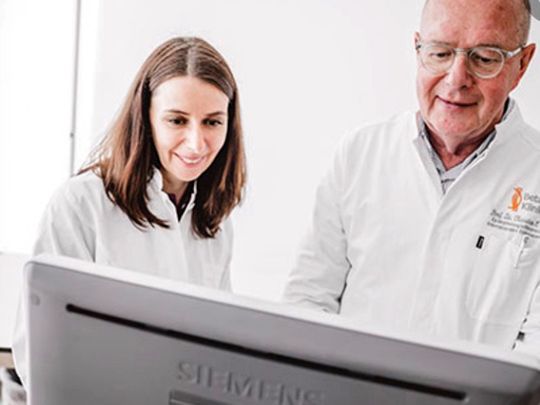
Abu Dhabi: Over the past few decades, the Arabian Gulf region has seen an alarming rise in the number of cases of epilepsy, particularly among children.
Worldwide, more than 250 million people are living with this condition. Unfortunately, the majority of nations outside the group of developed countries or the so-called ‘first world’ do not devote enough resources to eliminate this condition or look for effective treatments.
Advanced scientific diagnosis and specialised medical personnel for research in therapeutic institutions are required to study epileptic patients. Prof. Dr Christian E. Elger, German specialist in Neurology and senior professor for Neuropaediatrics/Paediatric Epileptology (Charite Berlin) and visiting professor at University Hospital shares with Gulf News the causes behind the spread of epilepsy in this region and ways to detect, diagnose and treat the condition.
GULF NEWS: What are the most common symptoms of epilepsy? When do these symptoms first present themselves and what kind of conditions can prompt epileptic seizures?
DR CHRISTIAN E. ELGER: Epilepsy is not a disease in the strict sense, but a large group of diseases characterised by repeated epileptic seizures.
There are many causes of epilepsy. They range from genetic changes, malformations of the brain, damage due to lack of oxygen at birth, acquired conditions such as scarring in the hippocampus (Ammon’s horn sclerosis) to tumours, vascular malformations and other diseases such as tuberous sclerosis. It is therefore a group of diseases defined by symptoms (seizures) that have many causes.
Seizures can occur frequently at an early age and also beyond the age of 60. However, it is the latter group that is affected more frequently by this condition. The lowest risk is between the ages of 16 and 60. In childhood, congenital changes and genetic defects can lead to the onset of epilepsy, while in old age, it is vascular damage in the central nervous system and other related degradations (development of dementia) and the likes that can lead to this condition.

QUESTION: Although epilepsy is considered to be rare among young children, there appears to be a high prevalence of it in the Arabian Gulf. What could be the reason behind this? Do you think that environmental pollution or poor diet can have a role in this? Or is it entirely genetic?
Epilepsy, when considered as a disease, is one of the most common neurological diseases. And childhood seizures are extremely common. In the Arab world, people like to marry within a family. This can lead to an accumulation of genetic defects, which often trigger epilepsies. Environmental factors and poor nutrition do not have any role in this.
QUESTION: What advise will you like to give to parents should their children develop epileptic seizures? What preventive measures can be adopted?
When a child is diagnosed with an epileptic seizure, a comprehensive diagnosis must be made. It may be that an acute inflammation is already present or is developing. Epilepsy can be determined by magnetic resonance imaging (MRI) and, if necessary, through genetic testing. Only then can a specific therapy be planned. In childhood, a ‘syndrome diagnosis’ is important. This means that the form of epilepsy is determined through examinations, which is then treated accordingly. Neuro-paediatric expertise should be obtained at an early stage for this purpose.
QUESTION: What role does early diagnosis and treatment play in treating this condition in children?
Early diagnosis and treatment are absolutely important. Especially in severely-affected patients, early therapy can prevent the patient’s brain performance from becoming limited or more severely impaired.
Read more
QUESTION: There are certain types of medicines for epilepsy treatment. Can any kind of epilepsy be treated with surgical intervention?
There are a variety of medicines for treatment of epilepsy. However, these are not drugs against ‘epilepsy’ as such, but drugs against the seizures. They do not cure epilepsy, but treat the cause that leads to epilepsy and thereby control the seizures. It all depends on correct diagnosis.
Surgical treatment of epilepsy is based on the idea that in a small proportion of epileptic patients, a narrowly-defined change in the brain is responsible, which can also be eliminated through surgery or laser ablation, without the patient experiencing any neurological deficits later on. About 5-10 per cent of all epileptic patients require surgery.
QUESTION: As a doctor who specialises in diagnosis and treatment of epilepsy, what treatments do you prefer and why?
Epilepsy therapy — whether through medication, surgery or special diet (keto) — is a personalised approach. There is no procedure or therapy that can be prescribed across the board to every patient.











